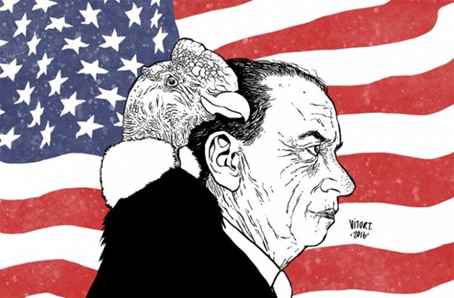
Image: Victor T.
By Mark Weisbrot, on Huffington Post
The day after the impeachment vote in the lower house of Brazil’s congress, one of the leaders of the effort, Senator Aloysio Nunes, traveled to Washington, D.C. He had scheduled meetings with a number of U.S. officials, including Thomas Shannon at the State Department.
Shannon has a relatively low profile in the media, but he is the number three official in the U.S. State Department. Even more significantly in this case, he is the most influential person in the State Department on U.S. policy in Latin America. He will be the one recommending to Secretary of State John Kerry what the U.S. should do as the ongoing efforts to remove President Dilma Rousseff proceed.
Shannon’s willingness to meet with Nunes just days after the impeachment vote sends a powerful signal that Washington is on board with the opposition in this venture. How do we know this? Very simply, Shannon did not have to have this meeting. If he wanted to show that Washington was neutral in this fierce and deeply polarizing political conflict, he would not have a meeting with high-profile protagonists on either side, especially at this particular moment.
Shannon’s meeting with Nunes is an example of what could be called “dog-whistle diplomacy.” It barely shows up on the radar of the media reporting on the conflict, and therefore is unlikely to generate backlash. But all the major actors know exactly what it means. That is why Nunes’ party, the Social Democracy Party (PSDB), publicized the meeting.
To illustrate with another example of dog-whistle diplomacy: On June 28, 2009, the Honduran military kidnapped the country’s president, Mel Zelaya, and flew him out of the country. The White House statement in response did not condemn this coup, but rather called on “all political and social actors in Honduras” to respect democracy.
This dog-whistle signal worked perfectly; most importantly the coup leaders and their supporters in Honduras, as well as every diplomat in Washington, knew exactly what this meant, even as statements condemning the coup and demanding the restoration of the democratic government came pouring in from around the globe. Everyone knew that this was, in diplomatic code, a clear statement of support for the coup. The events that followed over the next six months, with Washington doing everything it could to help consolidate and legitimize the coup government, were pretty much predictable from this initial statement. Hillary Clinton later admitted in her 2014 book, “Hard Choices,” that she worked successfully to prevent the return of the democratically elected president.
Tom Shannon has a reputation among Latin American diplomats as an amiable fellow, a seasoned career foreign service officer who is willing to sit down and talk with governments that are at odds with U.S. policy in the region. But he has had a lot of experience with coups. Some of Hillary Clinton’s released emails shed additional light on his role in helping to consolidate the Honduran coup. He was also a high-level State Department official during the April 2002 coup in Venezuela, in which there is substantial documentary evidence of U.S. involvement. And when the parliamentary coup in Paraguay took place in 2012 — something similar to what is happening in Brazil but with a process that impeached and removed the president in just 24 hours — Washington also contributed to the legitimation of the coup government in the aftermath. (By contrast, South American governments suspended the coup government in Paraguay from MERCOSUR, the regional trading bloc, and UNASUR [the Union of South American Nations).] Shannon was ambassador to Brazil at that time, but was still one of the most influential officials in hemispheric policy.
The U.S. State Department responded to questions about Nunes’ meetings by saying, “This meeting had been planned for months and was arranged at the request of the Brazilian embassy.” But this is irrelevant. It merely means that Brazilian embassy staff were, as a matter of diplomatic protocol, involved in arranging the meetings. This does not imply any consent by the Rousseff administration, nor change the political message that the meeting with Shannon sends to the opposition in Brazil.
All of this is of course consistent with Washington’s strategy in response to the left governments that have governed most of the region in the 21st century. They have rarely missed an opportunity to undermine or get rid of any of them, and their desire to replace the governing Workers’ Party in Brazil with a more compliant, right-wing government is fairly obvious.
Mark Weisbrot is co-director of the Center for Economic and Policy Research in Washington, D.C., and the president of Just Foreign Policy. He is also the author of the new book “Failed: What the ‘Experts’ Got Wrong About the Global Economy“ (2015, Oxford University Press).


